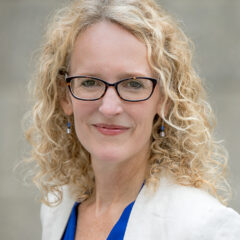(RNS) — The election of Pope Leo XIV has felt like a balm, as the Chicago native who spent decades in Peru has revealed himself as a leader with a modern globalist perspective, rooted in dignity, solidarity and mercy. The warm reception he’s received from Catholics and non-Catholics alike shows how much his outlook is needed.
There is one group that’s not so enthusiastic. “This is all a very calculated move,” warned Sean Feucht, a Christian nationalist influencer in the Trump orbit. “They chose a globalist and woke Pope from the West ON PURPOSE to stand up and criticize the leaders of the Free World.”
Fringe-right commentator Laura Loomer, who has advised President Trump on national security appointments, called Leo a “WOKE MARXIST POPE” and “a Marxist puppet in the Vatican.”
Why such fury? It’s not because Leo espouses liberal theological views — he doesn’t. He holds traditional Catholic positions on sexuality and abortion and prefers the liturgical formalism many conservatives favor. Leo has become a MAGA flashpoint not due to any dramatic break from Catholic doctrine, but because his worldview directly threatens the Christian nationalist engine behind the rising authoritarianism of our time. He threatens to become a transnational counterweight to a rapidly expanding authoritarian religious network.
Before the conclave, as Cardinal Robert Prevost, Leo retweeted a post criticizing U.S. President Trump and El Salvadoran President Nayib Bukele for mocking immigrants being deported from the U.S. to Bukele’s jails. The future pope also challenged Vice President JD Vance’s “ordo amoris” argument that Christians should prioritize their own nation over global needs. “Jesus doesn’t ask us to rank our love for others,” the cardinal tweeted.
This was no minor theological dustup over the proper “order of love” Christians should obey. It was a direct rebuttal to the ideological foundation of Christian nationalism: that faith should serve state nativist power and preserve national sovereignty at the expense of human rights.
Christian nationalism is not a uniquely American phenomenon. Russia’s Vladimir Putin has used the Orthodox Church to launder the legacy of Soviet authoritarianism and sanctify nationalist aggression. Hungary’s Viktor Orbán has refined the Christian nationalist playbook, conflating immigration with national collapse and portraying European Union officials as threats to Hungary’s Christian identity.
In Uganda, President Yoweri Museveni, influenced by American conservative Christians, criminalized LGBTQ+ communities, setting them up for harassment, imprisonment and potentially the death penalty. In Brazil, Jair Bolsonaro used similar tactics to rally evangelical Christians, claiming his opponent in recent elections would close churches. After losing that election, he incited an insurrection reminiscent of Jan. 6, where mobs waving Christian banners attacked government buildings.
The American Christian Right has played a central role in the creation of this transnational movement merging religious identity with authoritarian rule. Its leaders increasingly collaborate across borders — culturally, politically and financially — to impose a rigid moral order, polarize the public and erode democratic institutions.
Funded by fossil-fuel billionaires and with strategic support from far-right operatives such as Steve Bannon, Christian nationalists have established international networks to roll back gender rights, embolden strongmen and promote anti-democratic messaging. They’ve built alliances with sympathetic governments, particularly in Eastern Europe, Latin America and Africa. This month, U.S.-based Christian right leaders are hosting a continental summit in Africa aimed at seeding Christian nationalist power in national governments.
The connective tissue? A shared strategy of using religion to justify authoritarian consolidation and frame dissent as sacrilege.
The election of Leo XIV signals that not all global religious institutions are capitulating.
Commentators expect Leo to continue to align the papacy with marginalized communities targeted by the global right, in the spirit of Pope Francis, who invited 40 migrants, transgender individuals and those experiencing homelessness to personally receive his coffin as it entered the Basilica of St. Mary Major.
The implications go beyond such symbolism. The Catholic Church, the world’s largest religious institution, plays a complex role in global affairs, often shaping public sentiment and influencing political alliances. Leo has already shown that he rejects the premises of the Christian nationalist movement, which thrives on polarization and convincing believers that compassion for outsiders is weakness. His tweets to Vance pushed back on the idea that national sovereignty trumps human rights and that political violence is a legitimate defense of “faith.”
MAGA influencers understand that when Leo speaks, people listen — not just Catholics, but others looking for spiritual leadership grounded in clarity. His critics know how powerful that can be.
That’s why Pope Leo’s election also offers hope, because he reminds the world that religious conviction need not serve nationalist power. It can, instead, call us to global responsibility — to protect the vulnerable, honor the dignity of every person and resist tyranny in all its forms.

The Rev. Jennifer Butler. (Photo by David F. Choy)
In a moment when the line between spiritual leadership and political manipulation is dangerously thin, that reminder couldn’t be more timely.
(The Rev. Jennifer Butler, the founder of Faith in Democracy and Faith in Public Life, chaired President Obama’s third Advisory Council on Faith-Based and Neighborhood Partnerships. The views expressed in this commentary do not necessarily reflect those of Religion News Service.)



